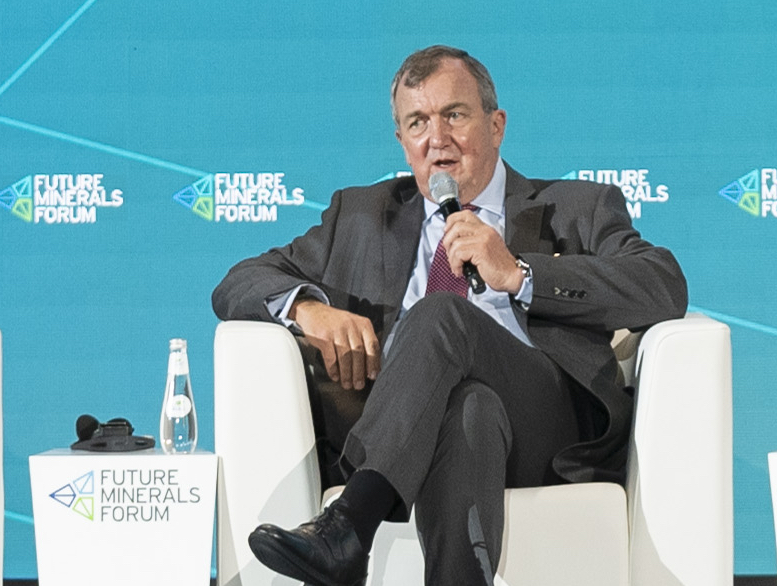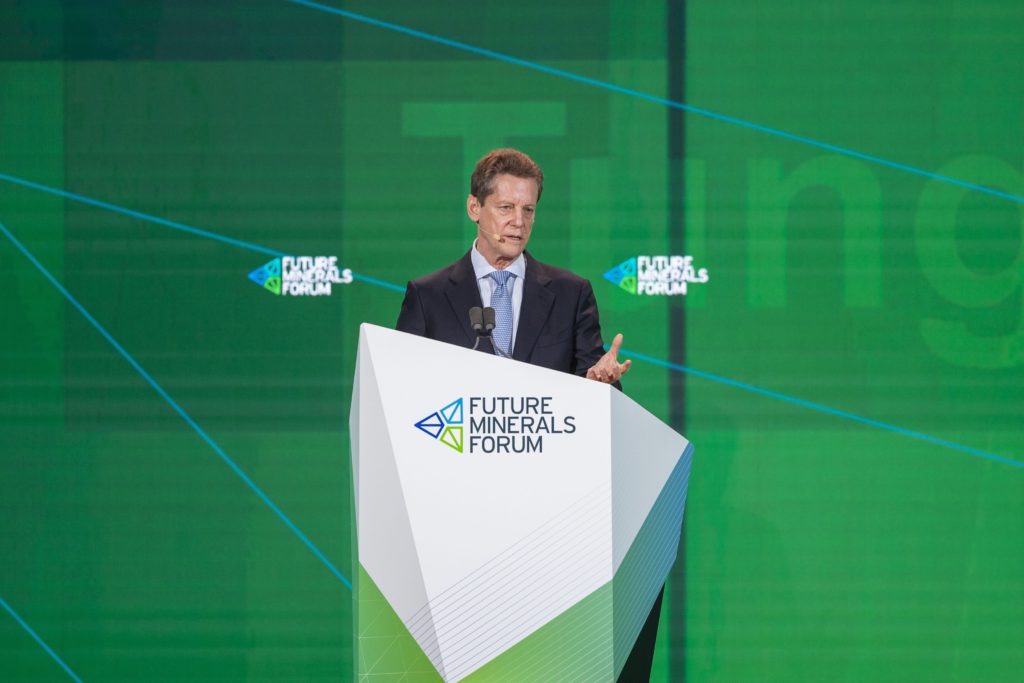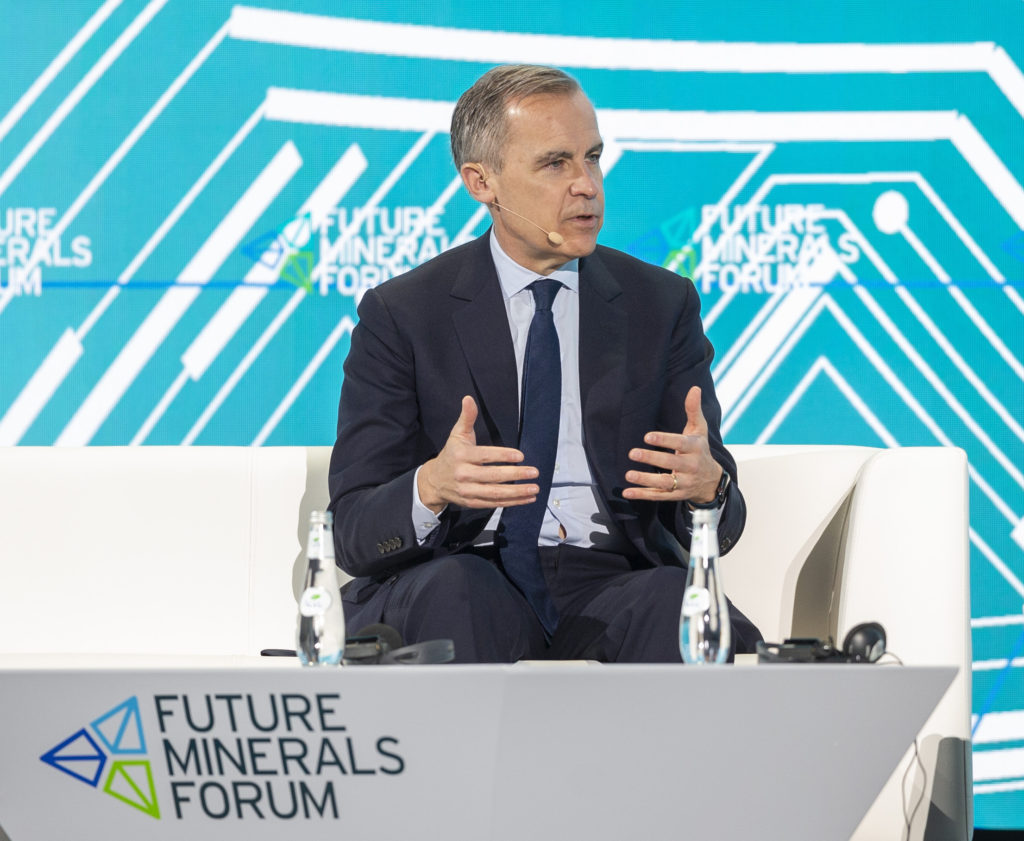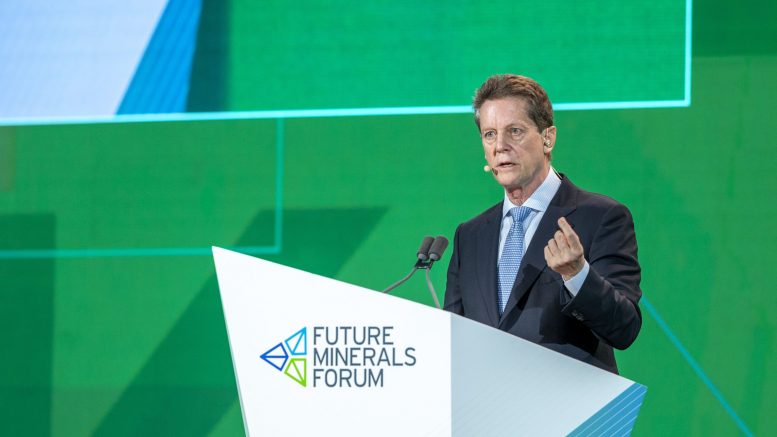Saudi Arabia is one of the world’s oil powerhouses, boasting the second-largest proven reserve of the slick stuff. Still, as the inaugural Future Minerals Forum recently held in Riyadh heard, the kingdom is prepping for a pivot to embracing metals essential to developing the future global economy.
Saudi Arabia is looking to invest its massive capital potential to develop its mining industry, from exploration to downstream battery metal processing. Perhaps more impactfully, the country has an opportunity to become the hub for mineral knowledge and finance for the Middle East, Africa and Central Asia region.
Attendees were left to ponder whether the country could use its experience from OPEC to create something similar with mineral producers say in Africa? Or, are we seeing the emergence of an energy metals OPEC?
Saudi Arabia has committed to a low carbon economy. To this end, it is collaborating to build the new city of NEOM, in the Tabuk province of northwestern Saudi Arabia. It is planned to incorporate innovative city technologies and function as a tourist destination.
The kingdom has set aside US$500 billion to build a city with no carbon footprint.
The Future Minerals Forum attracted industry A-listers, a sign of how serious the kingdom is about embracing the metals industry as a cornerstone for its future economic prosperity.
Barrick Gold‘s (TSX: ABX; NYSE: GOLD) CEO, Mark Bristow, said the kingdom had the unique opportunity to reimagine how the mining industry functions. It was a first for him to see a country marketing itself to form meaningful partnerships with the mining industry.
“Reimagining mining is such an interesting topic because it means we need to start again,” he told the conference. “We need to, as miners, reach out and recognize we have stakeholders – not only shareholders who are important – but equally important, our host countries and communities around our mines, the population and the countries we work at.”

Barrick Gold’s President and CEO Mark Bristow speaking as part of a panel discussion at the 2022 Future Minerals Forum in Riyadh, Saudi Arabia. Credit: FMF
According to Bristow, the way forward is solidly anchored by environmental, social, and governance (ESG) based investment principles.
Previously, the industry was not collaborating on a global scale regarding ESG. There are significant economic groups globally who comprise the big polluters. While it’s essential for them to commit to lower carbon emissions, he cautioned the importance of these nations to make sure they bring the rest of humanity along for the ride. “No one’s thinking about the developing world, and that’s the part where poverty is a bigger threat to the future of this planet than anything else,” said Bristow.
Bristow has an established track record of advocating for the power mining as the primary sector has to uplift nations and create wealth per capita.
Miners also has a huge role in the burgeoning energy transition. “There’s a massive responsibility to coordinate the transition across the world and not deny those developing economies continued development. To do that, you need metals, you need minerals, you need the hard rocks,” said Bristow.
“Right now, in a broad sense, there’s a lot of promises out there with very few plans, and we need that to change,” he said.
Part of the answer, according to Bristow, is to invest in young talent. The other part is to invest in new technologies to advance energy storage efficiencies.
Bristow said mining offered countries the primary building blocks to advance their economies. “If we are honourable and committed to real stakeholder involvement, it would drive a lot of economic change and upliftment across the globe when no other businesses are doing that,” said Bristow.
“If we are honourable and committed to real stakeholder involvement, the goal drives a lot of economic change and upliftment across the globe.”
That change starts at home. Saudi Arabia has been implementing reforms from the top down.
Electrum Group chairman, Thomas Kaplan, said that Saudi Arabia’s ambition was well underway with great miners in attendance such as Bristow and Robert Friedland. According to him, to have practitioners of best practices in the mining sector involved, one would encompass all aspects of ESG.
“This is not your grandfather’s Saudi Arabia,” said Kaplan. “This is arguably the most critical reform centre in the world today, if not most of the world.”
The environment, the cultural heritage preservation, the opening up of new mining areas, and the creation of transparency in the hydrocarbon industry sets the scene for a new advanced metals technology centre of excellence to emerge.
“And I’m not only talking about the developing world but in the developed world as well including the West, including the United States. In many respects it is going backwards. Saudi Arabia is one of the few countries globally, and it’s part of a regional trend socially – the religious police are gone, there have been changes in the guardianship rules,” he said.
“Prince Mohammed bin Salman is executing a revolution from above in being able to take Saudi Arabia forward, and it is resulting in the opening up of the mineral sector in Saudi Arabia. I’m confident that they are participating in an epic, transcendent revolution within this region,” said Kaplan.
Mining personality Robert Friedland added the big-thinking perspective. “Everything we touch is either mined or grown agriculturally,” he said.
According to the mining entrepreneur Saudi Arabia, as a major oil-producing country globally, is already entrenched in mining. “When you drill a well looking for oil, well, it takes steel and takes metal,” he reminded the audience.

Robert Friedland, Founder and Co-Chairman of Ivanhoe Mines, speaking at the 2022 Future Minerals Forum in Riyadh, Saudi Arabia. Credit: FMF
“It produces oil and creates energy that the world needs. We will see mining completely reinvent itself with the support of the Saudi government. With its forward looking-policy, enormous changes will accelerate,” said Friedland.
Segueing into Bristow’s passion for young talent acquisition and retention, Friedland said a younger generation of Saudis armed with the leading energy position in the world is in a place to truly take a new look at mining and develop it on truly sustainable principles.
“The central location of this kingdom, the enormous energy of its useful government, and vision for 2030 can make this the mining capital of the world,” Friedland proclaimed.
Friedland’s approach encompasses a big-picture view. “We need to look at the world from the cradle to the grave, from sperm to term, how the whole system has to be looked at and reinvented.”
Friedland said the energy transition depended entirely on metals, especially copper, nickel and other metals.
“If we are to make any progress on the reduction of hydrocarbon and make you a better world – hydrocarbon is not a bad thing, hydrocarbon has brought us to the current state of human civilization – but every global wind turbine fleet we’re building will entail demand of another 5 million tonnes of copper by 2028 to satiate the increasing pace of industrialization.”
Friedland emphasized how copper is the metal that drives the future. “2028 is tomorrow morning, ‘Vision 2030’ is tomorrow morning in the history of our species. They’ll be none of these giant wind farms without copper metal. Copper is the electric vehicle story. It depends on copper completely.
“In 2030, we will have at least 20 million EV charging points globally. We’ll need a 250% increase in current copper consumption just to accomplish that. And by 2040, we’ll need 4 million tonnes, just for passenger EVs, but of course, the story doesn’t stop at the electric car.
“The advent of hydrogen fuel celled vehicles will also depend heavily on an electrified chassis, expanding demand for copper further,” he said.
The advent of electrified industrial vehicles scales up these demand curves exponentially.
“There’s seven, eight, nine million people scheduled to be on this planet. How much global warming do we create even to make those cars if everybody has a car? How is electric energy generated and transmitted?
“In six, short years, we’ll produce 22 million EVs a year,” he said.
“I believe that the young people of Saudi Arabia have a critical and bright future in the whole system of maintaining energy security for the world because energy security is number one.”
“It’s a fraud to say that we have enough nickel and copper to electrify all the world’s cars. We can electrify some cars for people who can afford that, but not all cars. And so, I can assure you humanity will depend on the forms of energy security that comes to the kingdom of Saudi Arabia for a long, long time,” said Friedland.
Aside from the evident low-hanging fruit in the energy transition, Saudi Arabia also has significant additional opportunities, including the investments in hybrids of carbon capture, suggested Mark Carney, Vice Chair and Head of Transition Investing for Brookfield Asset Management, as well as the UN Special Envoy for Climate Action and Finance.

Mark Carney, Vice Chair and Head of Transition Investing for Brookfield Asset Management, speaking at the 2022 Future Minerals Forum in Riyadh, Saudi Arabia. Credit: FMF
“Saudi Arabia also has a great logistical position that is investing heavily in logistics. So, from a commercial perspective, we have the world moving to that net-zero target and the huge demand that comes from that. It’s important. The miners will benefit from this investment,” he said.


Be the first to comment on "Key insights from the inaugural Future Minerals Forum in Riyadh"